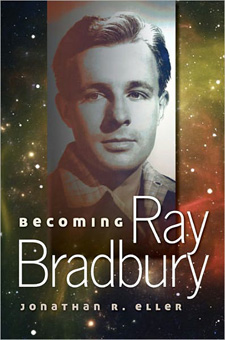Read This: Becoming Ray Bradbury
 A while back, I did a review for Shelf Awareness of Becoming Ray Bradbury, a critical biography that pays close attention to Bradbury’s formative years, showing how his early love for science fiction and fantasy was tempered on the forge of literary ambition to create a distinctive voice, a steady process of refining his craft that culminates (at least in this particular analysis) with the publication of Fahrenheit 451—perhaps the one science fiction novel any random American under the age of 60 is likely to have read, thanks to generations of junior high and high school English teachers. And yet that very ubiquity can make it easy to forget that Bradbury wasn’t always quite so iconic; Jonathan Eller does an excellent job of recounting Bradbury’s long struggle for acceptance by literary lions, not just as the one science-fiction guy they could stand but as a “real” writer.
A while back, I did a review for Shelf Awareness of Becoming Ray Bradbury, a critical biography that pays close attention to Bradbury’s formative years, showing how his early love for science fiction and fantasy was tempered on the forge of literary ambition to create a distinctive voice, a steady process of refining his craft that culminates (at least in this particular analysis) with the publication of Fahrenheit 451—perhaps the one science fiction novel any random American under the age of 60 is likely to have read, thanks to generations of junior high and high school English teachers. And yet that very ubiquity can make it easy to forget that Bradbury wasn’t always quite so iconic; Jonathan Eller does an excellent job of recounting Bradbury’s long struggle for acceptance by literary lions, not just as the one science-fiction guy they could stand but as a “real” writer.
Fortuitously, Harper Perennial has just put out the paperback edition of A Pleasure to Burn, a collection of several of the stories Eller discusses—stories in which Bradbury first began to grapple with the themes of Fahrenheit 451. There are stories about book burning, and about the resistance that can be offered against it—and the resistance that can be offered against any attempt to stifle our imaginations. But there are also stories about the rise of the type of government that would believe book burning would be an acceptable form of social engineering, where walking along a sidewalk becomes a suspicious activity and contingency plans have been drawn up for the garbage trucks to collect the corpses after a nuclear war. And there are the two novellas, “Long After Midnight” and “The Fireman,” that serve as “trial runs” for the novel, both centered on the fireman Montag and his growing attraction to the forbidden books and the freedom of thought they represent. (Note: “Long After Midnight” is not the story which appeared years later in a short story collection of the same name; essentially, it’s a first draft of “The Fireman.”)
I had a great time with Eller’s biography; he’s extremely rigorous about tracking the details of Bradbury’s literary development without getting bogged down in an academic prose style. So my interest never flagged, and though I knew the rough outcome—I read Fahrenheit 451 in junior high, too—I wanted to hear all the details. And I really want the sequel that Eller ought to write, since he ends the story just as Bradbury is about to head off to Ireland to write a screenplay of Moby DIck for John Huston. That’s a story I want to hear…
27 August 2011 | read this |

 Our Endless and Proper Work is my new book with Belt Publishing about starting (and sticking to) a productive writing practice.
Our Endless and Proper Work is my new book with Belt Publishing about starting (and sticking to) a productive writing practice. 
